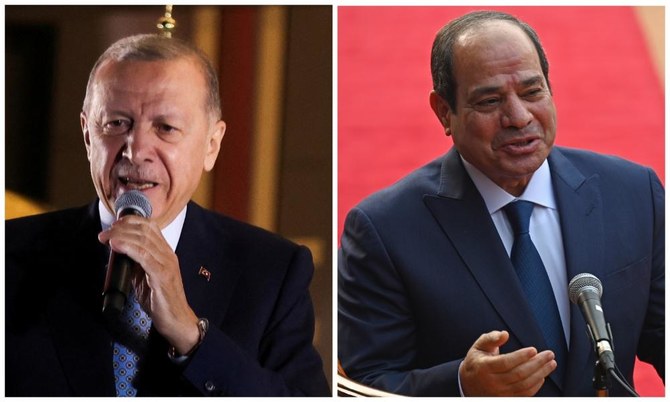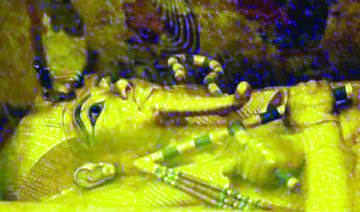CAIRO: Egypt President Abdel Fattah El-Sisi and Turkish President Recep Tayyip Erdogan agreed on “the immediate start of upgrading diplomatic relations, exchanging ambassadors,” Egypt’s presidency said in a statement on Monday.
El-Sisi spoke with Erdogan in a phone call to congratulate him on his presidential win.
Egypt’s foreign minister Sameh Shoukry visited Turkiye in April and met his Turkish counterpart Mevlut Cavusoglu, the two parties agreed then on specific time frame to raise the level of diplomatic relations and to prepare for a summit between the two presidents.
The presidents may meet in person again after Turkiye’s May 14 election, Cavusoglu said in April.
Egypt’s El-Sisi, Turkiye’s Erdogan agree on reinstating ambassadors
https://arab.news/vx25f
Egypt’s El-Sisi, Turkiye’s Erdogan agree on reinstating ambassadors

Returning Syrian refugees cut global displaced total

- UN believes 1.5m from abroad and 2m internally displaced will be home by the end of 2025
GENEVA: Refugees returning to Syria have cut the global total of displaced people from a record peak at the end of 2024, the UN said on Thursday.
More than 500,000 have returned from abroad and 1.2 million internally displaced people have gone back to their home areas since Bashar Assad was deposed in December. The UN refugee agency estimates 1.5 million from abroad and 2 million internally displaced will return by the end of 2025.
Worldwide, a record 123.2 million were forcibly displaced by last December, but the total had fallen to 122.1 million by the end of April. The main drivers of displacement were conflicts in Sudan, Myanmar and Ukraine.
“We are living in a time of intense volatility ... with modern warfare creating a fragile, harrowing landscape marked by acute human suffering,” UN refugee chief Filippo Grandi said. “We must redouble our efforts to search for peace and find long-lasting solutions for refugees and others forced to flee their homes.”
Syria condemns ‘blatant violation’ of sovereignty after Israeli incursion

- One person killed and 7 captured during the pre-dawn operation in Beit Jin, Interior Ministry says
DAMASCUS: Syria’s Interior Ministry condemned an Israeli incursion in southern Syria, saying Israeli forces killed one person and abducted seven others, calling it a “blatant violation” of the country’s sovereignty.
“We affirm that these repeated provocations constitute a blatant violation of the sovereignty of the Syrian Arab Republic,” the ministry said in a statement, adding that “these practices cannot lead the region to stability and will only result in further tension and turmoil.”
The Israeli military said those detained during the pre-dawn raid on Beit Jin were suspected of planning attacks against Israel, and that weapons also were found in the area.
They were taken back to Israel for questioning, the military said.
One person was killed and seven captured in the operation, Syria’s Interior Ministry said, while the father of the young man killed said he had a history of mental illness.
Since the fall of President Bashar Assad’s government in early December, Israeli forces have moved into several areas in southern Syria and conducted hundreds of airstrikes throughout the country, destroying much of the assets of the Syrian army.
Local broadcaster Syria TV described Thursday’s raid as being carried out by about 100 Israeli troops who stormed Beit Jin, near the border with Lebanon, and called out the names of several people targeted for arrest through loudspeakers.
Syria’s Interior Ministry said such incursions spike tensions in the region.
“Such repeated provocative acts are a flagrant violation of Syria’s sovereignty,” the ministry said in a statement.
Village official Walid Okasha said that Israeli troops had entered the outskirts of Beit Jin in recent months, but that this was the first time they entered the center of the village.
He added that Thursday’s operation came four days after an Israeli drone strike hit a car in the village, inflicting casualties.
“They came targeting specific people,” said Okasha, who denied that Hamas members were in the village.
He said the seven people taken to Israel were all Syrians and that two of them were members of the country’s new security forces.
He said the man who was killed suffered from mental illness.
Ahmad Hammadi identified the victim as his son and told the AP that he had a history of schizophrenia.
He said his son was shot dead in front of his home, and that he had no links to Hamas.
He said two of the captured men were his nephews. Hussein Safadi said his two sons, Ahmad, 32, and Mohammed, 34, were captured, adding that his younger son, who raises goats, had lived in Lebanon for years until recently.
He said his younger son was a member of the armed opposition against Assad and recently joined the security forces of the new authorities. As for why Israeli forces seized his sons, “we don’t know the reasons,” Safadi said.
During a visit to France last month, Syrian President Ahmad Al-Sharaa said that his country is holding indirect talks with Israel to prevent hostilities from getting out of control.
Egypt blocks activists aiming to march to Gaza to draw attention to humanitarian crisis

- Egyptian authorities and activists both said Thursday that people planning to march across the Sinai Peninsula were deported
RABAT: Egypt blocked activists planning to take part in a march to Gaza, halting their attempt to reach the border and challenge Israel’s blockade on humanitarian aid to the Palestinian territory before it could begin.
Egyptian authorities and activists both said Thursday that people planning to march across the Sinai Peninsula were deported.
To draw attention to the humanitarian crisis afflicting people in Gaza, marchers have for months planned to trek about 30 miles (about 50 kilometers) from the city of Arish to Egypt’s border with the enclave on Sunday to “create international moral and media pressure” to open the crossing at Rafah and lift a blockade that has prevented aid from entering.
Saif Abu Keshek, one of the activists organizing the march, said that about 200 activists — mostly Algerians and Moroccans — were detained or deported.
But those arriving to the Cairo International Airport on Thursday afternoon were allowed into Egypt, the Spain-based activist added. Organizers have not received approval from Egyptian authorities for Sunday’s march and were evaluating how to proceed, he said.
An Egyptian official on Thursday said more than three dozen activists, mostly carrying European passports, were deported upon their arrival at the Cairo International Airport in the past two days.
The official said the activists aimed to travel to Northern Sinai “without obtaining required authorizations.” The official spoke on condition of anonymity because he was not authorized to brief the media.
King Tut gold mask to leave Cairo museum after nearly 100 years

- King Tutankhamun’s treasures to move to new Grand Egyptian Museum near Giza Pyramids
- More than 5,000 artefacts from his tomb will be displayed at the $1-billion megaproject opening next month
CAIRO: After nearly a century in the Egyptian Museum in Cairo, King Tutankhamun’s iconic gold mask and remaining treasures are set to move to the new Grand Egyptian Museum near the Giza Pyramids.
Visitors have just days left to see the boy king’s world-famous gold funerary mask before it joins more than 5,000 artefacts from his tomb at the GEM, a $1-billion megaproject opening on July 3.
“Only 26 objects from the Tutankhamun collection, including the golden mask and two coffins, remain here in Tahrir,” said museum director Ali Abdel Halim.
“All are set to be moved soon,” he told AFP, without confirming a specific date for the transfer.
The government has yet to officially announce when or how the last artefacts will be relocated.
Still on display are the innermost gold coffin, a gilded coffin, a gold dagger, cosmetic box, miniature coffins, royal diadem and pectorals.
Tutankhamun’s treasures, registered at the Egyptian Museum on Cairo’s Tahrir square in 1934, have long been its crown jewels.
But the neoclassical building — with faded cases, no climate control and aging infrastructure — now contrasts with the high-tech GEM.
Once open, the GEM is believed to be the largest in the world devoted to a single civilization, housing more than 100,000 artefacts — with over half on public display.
In a dedicated wing, most of King Tut’s treasures will be exhibited together for the first time in history since British archaeologist Howard Carter discovered the young pharaoh’s intact tomb in 1922.
His mummy will remain in its original resting place in Luxor’s Valley of the Kings as it is “a vital part of the archaeological site,” Egyptian officials have said.
A virtual replica, however, will be displayed at the GEM using virtual reality technology.
The Egyptian Museum in Tahrir, long the historic heart of Egyptology, has lost in 2021 other star exhibits: 22 royal mummies including Ramses II and Queen Hatshepsut that were relocated in a widely watched state procession to the National Museum of Egyptian Civilization in Old Cairo.
Still, it is home to around 170,000 artefacts, according to the museum director, including treasures from Yuya and Thuya — Tutankhamun’s ancestors — and items from ancient Tanis, such as the golden funerary mask of King Amenemope.
A total of 32,000 artefacts have already been relocated from storage and display halls at the Tahrir museum to the GEM.
The museum’s director said the space left behind by Tutankhamun’s collection will eventually be filled by a new exhibition “on par with the significance of Tut’s treasures.”
Syria condemns Israeli incursion into Damascus countryside

- Atrack undermines Syria’s efforts to achieve stability and reconstruction, Foreign Ministry said
- Israeli forces entered Beit Jinn in Qatana area killing one civilian and detaining others
LONDON: The Syrian Arab Republic condemned an overnight incursion by Israeli forces into its southern territory, resulting in the death of a civilian and the detention of scores of residents.
“(The) escalation represents a clear violation of international law and relevant Security Council resolutions, including the 1974 Disengagement Agreement,” the Ministry of Foreign Affairs and Expatriates said in a statement on Thursday.
It added that the attack undermines Syria’s efforts to achieve stability and reconstruction and called on the UN Security Council “to take decisive steps to halt those repeated attacks and ensure respect for international law, in order to preserve regional security and stability.”
Syria’s Ministry of Interior said on Thursday that the Israeli forces killed one civilian and “kidnapped seven others during a raid in the town of Beit Jinn, (in the) Damascus countryside” overnight.
The Israeli forces, comprised of tanks, armored personnel carriers, and infantry vehicles, along with reconnaissance drones, entered Beit Jinn in the Qatana area in the country’s southern territory, 12 km from the Israeli-occupied Golan Heights.
“These practices cannot lead to stability in the region and will only lead to further tension and unrest,” the Ministry of Interior said.
Israeli forces took the detained Syrians into the territories it controlled following the fall of the Assad regime in December, and their fate remains “unknown,” the ministry added.




















